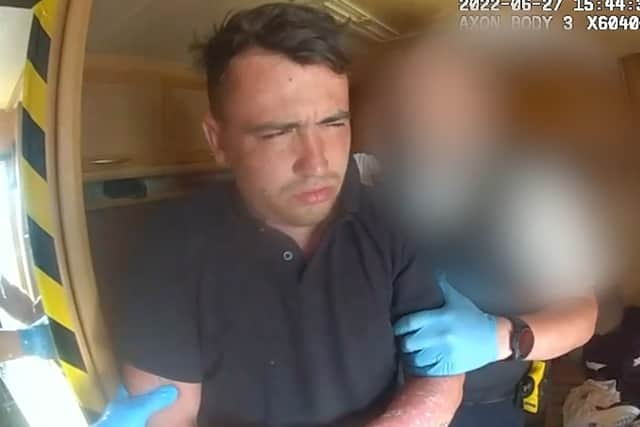Zara Aleena murder: What does the probation review report say about Jordan McSweeney?
and live on Freeview channel 276
A failure by the probation service to treat a violent offender as “high risk” left him free to murder and sexualy assault in Ilford, a review has found.
Zara Aleena, 35, was attacked and killed by Jordan McSweeney as she walked home in June 2022, nine days after he was released on licence from prison.
Advertisement
Hide AdAdvertisement
Hide AdIn December, the 29-year-old killer was sentenced to 38 years behind bars.
A review of the case was ordered last July by justice secretary Dominic Raab, and in a report published today HM Chief Inspector of Probation Justin Russell highlights a number of failings.
He said in a statement: “Jordan McSweeney should have been considered a high risk of serious harm offender. If he had, more urgent action would have been taken to recall him to prison, after he missed his supervision appointments on release from custody. The Probation Service failed to do so, and he was free to commit this most heinous crime on an innocent, young women.”


He referenced workloads and other pressures on the Probation Service as factors in the failings.
Prisons and Probation Minister Damian Hinds said the government is taking “immediate steps to address the serious issues raised”.
He promised improvements to risk assessments and training.
Key Events
- Probation treated killer Jordan McSweeney as “medium risk”
- Opportunities were missed to arrest McSweeney
- Damian Hinds, probation minister, apologised “unreservedly to Zara Aleena’s family”
- Probation failings “symptomatic of wider issues”, says Sadiq Khan
Action plan
HM Prison and Probation Service has published an action plan in response to the report.
Among the actions are an “urgent review” of the current Risk of Serious Harm Guidance, and changes to processes including management oversight of risk assessments.
Action plan
HM Prison and Probation Service has published an action plan in response to the report.
Among the actions are an “urgent review” of the current Risk of Serious Harm Guidance, and changes to processes including management oversight of risk assessments.
The family
Ms Aleena’s aunt Farah Naz described the report as “extremely distressing”, telling the BBC her family had “lost a loved member... for absolutely nothing”.
“We’re sad, we’re heartbroken, we’re still traumatised. It’s an effort to be alive,” she said.
Speaking to BBC News, she added McSweeney was given a licence to go ahead and “do whatever he wanted and he knew that because this is a system he knows”.
“Zara’s life was taken, and probation have blood on their hands. She would have been alive today if probation had done their jobs better.”
Recall to prison
The report notes that McSweeney had a “history of non-compliance” and that during his periods on licence, this was allowed to continue because of “delayed decision-making by probation staff and ineffective management oversight”.
“Following his release on June 17, there were missed opportunities to recall JM following failed appointments and risk factors emerging. Recall should have been initiated following non-attendance on June 20 2022, but management consultation did not consider recall and efforts made to locate JM were insufficient.”
When McSweeney’s recall to prison was initiated the probation officer’s manager was not fully informed and there was a delay in getting it signed off. This “meant the recall was not timely and ultimately delayed the opportunity for JM to be arrested by police”.
“Data indicates that the public protection casework section (PPCS), who process licence revocations in HMPPS, take an average of seven hours to issue a licence revocation,” the report says.
“National data on recalls also shows that the median time between licence revocation and a return to prison custody is three days. Had a recall been initiated following the missed appointment on 20 June, or completed within the specified timescale on 23 June, the time for police to locate and arrest JM would have been maximised.”


Allocation of Jordan McSweeney’s case
Issues were highlighted with the allocation of McSweeney’s case.
The report said: “Although he received 16-months in custody, taking into account his time spent on remand, he only had two months left to serve in prison at the point of his sentence and so his case should have been allocated directly to a community practitioner. The processes for allocating cases when a custodial sentence is imposed is confusing and cumbersome, impacting significantly on prerelease planning. Had allocation taken place correctly and earlier, probation staff would have had more opportunity to consider the risks posed by this individual and to amend the risk of serious harm assessment. As outlined above, this would have allowed for the exploration of other release arrangements and restrictive conditions.”
Not an isolated case
The report states that Jordan McSweeney is not the only offender to have been incorrectly assessed as medium risk.
“The inaccurate classification of risk was a key theme in our recent PDU (probation delivery unit) inspections in London,” it says. “Of the 137 medium risk of serious harm cases that were inspected across six local probation areas, seven per cent were deemed to have had their risk underestimated and should have been rated as high risk of serious harm rather than medium . Whilst this is only a sample, it does demonstrate the urgent need to ensure risk categorisations are accurate.”
Sadiq Khan
The Mayor of London, Sadiq Khan, said: “My thoughts are with Zara’s family and loved ones on this extremely difficult day. This is a damning report which makes clear that, even before Zara’s brutal murder, McSweeney was a dangerous, prolific and violent predator who should never have been left at liberty to take the life of an innocent young woman.
“The Probation Service has failed in this case and this failure is symptomatic of wider issues after 13 years of chaotic government policies and cuts, that must be addressed immediately. This must never be allowed to happen again. Women and girls have the right to be safe and to feel safe – whatever the time of day and wherever they are. But for these failings, Zara would still be here and her loved ones would not have to bear the burden of a life without here. It is vital that we ensure no other family has to endure what Zara’s family have had to and are going through.”
Lack of information sharing between the prison service and probation
The report goes on to say that the risk should have been reviewed by the Community Rehabilitation Company (CRC), which was responsible for the case.
It said McSweeney’s behaviour in custody was seen in isolation and that the risk was not treated holistically, “with the focus being on acquisitive offending, and a thorough assessment of other presenting risk factors was missing”.
“The lack of effective information sharing between prisons and probation contributed to an incomplete picture of JM’s risks and potential for violence and disruptive behaviour. The fact he spent a significant proportion of his adult years in custody made it difficult to gather significant information about his circumstances and potential behaviour in the community.”
“This strengthens the need for effective information sharing to ensure all known risk factors, behaviours and intelligence is gathered to produce effective risk management plans to use both whilst in custody and when in the community.”
Medium risk
HM Inspectorate of Probation’s report lists four key findings. The first relates to the treatment of McSweeney as “medium risk”.
The report says: “JM was managed as a “medium risk of serious harm Integrated Offender Management (IOM) acquisitive individual” however his level of risk should have been escalated to “high” in February 2021, based on the range of information available on his past history of violence as well as acquisitive offending.
“There was information known about risks present in custody, such as possession of weapons, violent and threatening behaviour. In addition, he had carried weapons in the community, as well as the risks posed to known adults.
“The risk to the public, staff and other prisoners, should have been assessed as high risk of serious harm. The risk of serious harm to known adults should also have been high based on information related to offences against a known female received in 2021, which later resulted in a restraining order being imposed.”
Government response
Damian Hinds, the prisons and probation minister, said: “This was a despicable crime and I apologise unreservedly to Zara Aleena’s family for the unacceptable failings in this case.
“We are taking immediate steps to address the serious issues raised by the Jordan McSweeney and Damien Bendall cases. This includes mandatory training to improve risk assessments, implementing new processes to guarantee the swift recall of offenders and we have taken disciplinary action where appropriate.
“We are also investing £155m a year into the Probation Service to recruit the thousands more officers who will deliver tougher supervision, protect the public and ensure these sorts of tragedies can never happen again.”
